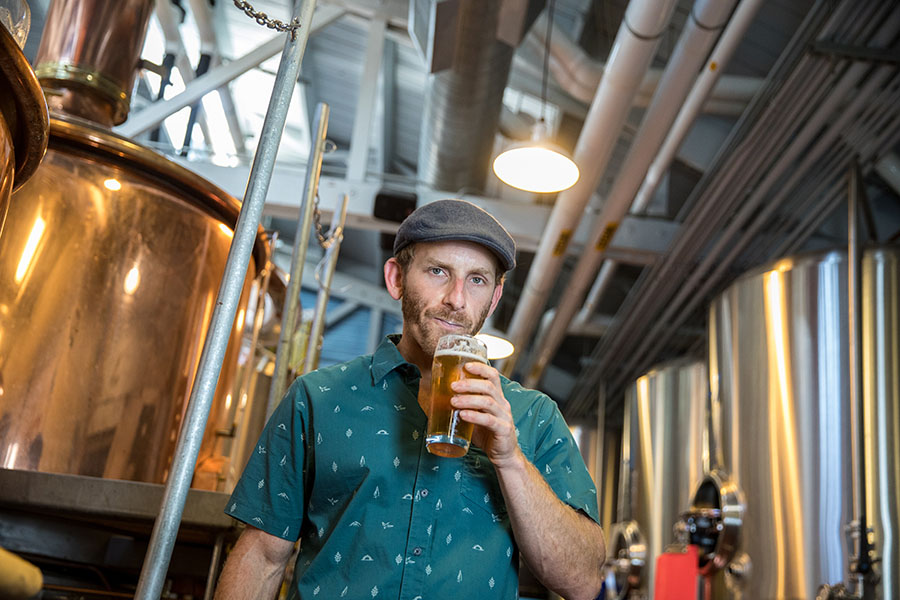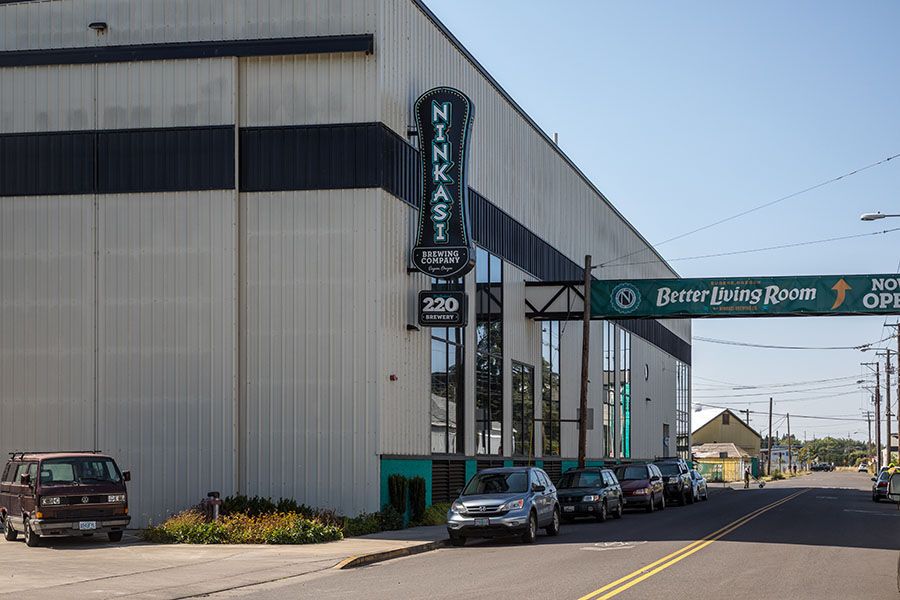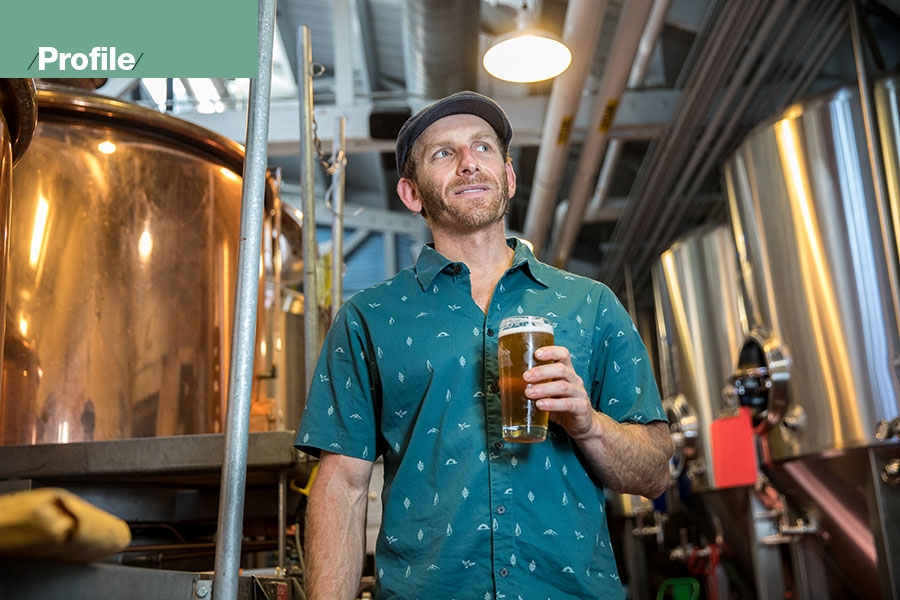Micah Elconin, founder of Eugene’s Table, uses his skills as a networker to grow a food and beverage manufacturing hub in Lane County.
Typically, food and beverage businesses face an uphill battle. With thin profit margins, a heavy reliance on supply chains and competition from large national brands, starting a food business can be a difficult prospect.
Unless you live in Lane County.
Word on the street is the county is in the middle of exciting growth as a food and beverage manufacturing hub. More than 4,000 people are employed in the sector, a 16% jump from 2017.
While no one person can account for the growth, if you ask around the industry, one name that pops up is Micah Elconin, head of Eugene’s Table, Lane County’s food and beverage partnership organization.
Elconin connects businesses in the sector, promotes Lane County products to buyers and investors, and finds opportunities for brands to increase exposure to new markets. His work has helped Lane County food and beverage manufacturing gain a solid footing, and he has plans to do the same for food and beverage manufacturing across the state.
“Micah is the linchpin for food manufacturing in this valley,” says Shaun Winter, owner of Hot Winter Hot Sauce. “Most of the people I meet can be tied back to Micah. He helps us find ways to work together we wouldn’t have done without him. He’s a cornerstone of food and beverage businesses in our county.”
Whether it is borrowing equipment, going in on a large order or finding new suppliers, Winter says that Elconin plays an essential role as the Lane County food and beverage sector’s connector in chief.
“He’s a genuine booster,” says Winter. “He uses our products. He talks about them with animation. I don’t have a marketing budget, and having someone out representing Eugene food products allows me exposure I wouldn’t have gotten otherwise.”
 Micah Elconin Photo: Jason E. Kaplan
Micah Elconin Photo: Jason E. Kaplan
Before he became the networker, cheerleader and ambassador for Lane County food and beverage manufacturers such as Coconut Bliss, Nancy’s Probiotic Foods and Ninkasi Brewing Company, Elconin overcame a personal tragedy that shut the door on a promising career as a professional chef.
While working as a chef in Santa Barbara, Calif., Elconin had just beaten out several other top candidates in the area for a lucrative personal cook contract. He decided to celebrate by going on a climbing trip with his girlfriend. On that trip he took a terrible fall, sustaining a grievous injury to his leg.
During his recovery, which consisted of five surgeries and 20 months on crutches, Elconin was unsure if he would ever be able to walk again without assistance. The ability to move quickly around the kitchen is a crucial skill for any chef, and it became painfully clear his culinary career had been cut short.
Elconin knew he could never give up his passion for food, and whatever he did for his new career, his love of food would have to play a central role. He decided he wanted to pursue a business career with a focus on food and beverage products.
Part of the job of being a chef is being a professional grocery shopper. After seeing stickers with “Made in Eugene, Oregon” on products he bought regularly, Elconin decided to pursue an MBA at the University of Oregon, believing the area was a perfect fit for someone wanting to break into the food and beverage manufacturing business.
Upon graduation, Elconin considered launching his own energy-bar product but instead took a job at Sprout!, a regional food hub in Springfield. While there, he developed brand and marketing strategies for local food companies, provided oversight to the Springfield Farmers Market, and recruited and coached clients for food business incubators, using his previous experience as a chef to mentor clients.
He found working with small brands and emerging food companies exciting, and left his job at Sprout! to pursue consulting work. In 2014 Elconin founded Season to Taste, a consulting firm specializing in emerging food businesses.
Elconin’s big break occurred in 2017 when the Lane County Sector Strategies Team, a partnership between regional workforce development, economic development, and city and business leaders, selected him as its new food and beverage sector strategist. Modeled after the Technology Association of Oregon, the program tasked a third-party strategist with creating and planning projects to connect people in the food and beverage industry with opportunities for capital.
“My role was to be the biggest fan, the catalyst, the instigator,” says Elconin.
In 2019, when the publicly funded project began to sunset, the companies he had been working with had already seen the value of having someone advocating for the industry. Many did not want Elconin and his skills in connection to go away.
“I looked back at the local industries and I told them this project is about to be over, and unless we find some other way to fund it, the work is going to end.” The companies he had been working with told him if he created the structure and the organization, they would buy into it.
“He went around asking people if they wanted to keep the position going, and it was an unequivocal ‘yes,’” says Dan Vishny, owner of Red Ape Cinnamon, a spice manufacturing company, and investor and member of Eugene’s Table since its inception.
“I’m pretty thrifty with money, but forming this organization has added a lot of value to a lot of people. He brought the big brands and the little brands together and asked ‘What do you need?’ and ‘Where’s the pain?’ Before Micah came along, everybody was operating independently,” says Vishny.
While Eugene was not a food desert before Elconin came along, there was no Eugene brand, says Vishny. Now there are hopes of a local trade show, and new talent and new buyers circulating regularly. “One of Micah’s amazing qualities is he brings people together,” says Vishny. “We’re going to become a brand like Boulder, Colorado. It’s already on its way.”
The Lane County area is a good spot to create a food and beverage industry. The area is not too metropolitan, which gives the region access to fresh farm produce and lower operating costs. It is also not too rural, being situated along Interstate 5. Trucks coming out of Eugene have manageable distance to California as well as Portland and Washington.
Eugene also has a welcoming and adventurous food culture that provides a steady stream of revenue for new food and beverage manufacturers.
 Ninkasi Brewing Company, a member of Eugene’s Table Photo: Jason E. Kaplan
Ninkasi Brewing Company, a member of Eugene’s Table Photo: Jason E. Kaplan
Elconin’s most important function is his ability to network in Portland. In 2019 the Oregon Entrepreneurs Network hosted its first annual Angel Food Conference, where companies could pitch their food products to investors.
Elconin was able to get plant-based food and beverage company SOHR Foods into the conference, and the Cottage Grove company ended up winning the PitchFest part of the event.
He also helps to connect local brands with larger government programs. In 2018 he worked with the Oregon Department of Agriculture and the Western United States Agricultural Trade Association to host a delegation of Chinese food buyers in Eugene, the first time the organization brought international buyers to the area.
“Normally these meetings and tours are hosted only in Portland,” says Elconin. “It was a really great opportunity for the ODA to showcase other parts of the state.”
Elconin created a quarterly business happy hour, which he says is the largest regular food and beverage happy hour in the state. He also helped coordinate the first-ever West Coast food and beverage startup weekend in Eugene.
While Eugene might have the blend of ingredients for food businesses, there is always room for improvement. Elconin works closely with his alma mater, the Lundquist College of Business at the University of Oregon, to make the food and beverage industry a larger part of its offerings. The college now teaches a Business of Food class, which Elconin jokes is a “soup to nuts” exploration of the industry.
He also acts as an intermediary between businesses and city hall. Local government, specifically the permitting department, was the place startups told him they experienced the most amount of friction.
Elconin led a series of talks that resulted in the formation of what the city of Eugene now calls the Development Investment Group, which advocates for business interests during the development of public work projects.
Elconin was raising money to build a year-round indoor farmers market in downtown Eugene when the COVID-19 pandemic swept in. While coronavirus has complicated his plans, he says it has not done the same amount of damage as it has in other industries, partly because the sector is used to dealing with disruptions.
“I don’t want to take away from the negative impacts of COVID, but in many ways it was business as usual, just a different set of problems they were managing,” says Elconin. “These companies are very fit when it comes to managing operation issues. The industry knows it is chaotic by nature. One has to be very adept at solving problems and moving quickly.”
Elconin is in talks with Northwest Food Solutions to devise new workforce education programs to train entry-level staff to meet employment needs.
COVID-19 has caused a surge in business for food-manufacturing companies. With less restaurant traffic, people are eating more at home and spending more money at the grocery store. The pandemic has increased interest in buying products online, an area in which food startups tend to excel.
“Some of our more established brands had their best months ever in April,” he says.
As for overall strategy and an overall goal, Elconin says he wants production hubs all over the state, not just in Lane County and Portland. He now serves as executive director of Cultivate Bend, a similar food and beverage manufacturing organization that seeks to replicate what has worked well in Lane County.
Central Oregon has a different business landscape, and has challenges and opportunities Lane County does not. “Anyone who has tried to drive over the Cascades in the middle of winter knows it can be a bit of a disaster,” he says. “At the same time, while it’s sometimes difficult to attract people to move to Lane County, Bend is one of the most sought-after places to live in the country.”
As more food hubs crop up, connecting them will be crucial. Over time, he says the opportunity exists to market the entire state as a food and beverage manufacturing hub.
“When we think about the marketing opportunities for these companies, and the larger economic opportunity in other parts of the world, Oregon is what they are going to be interested in, not necessarily Bend, Eugene or Portland,” he says. “Long term, our real opportunity is to leverage Oregon’s notoriety as a food community.”
It is a lofty goal, but one that drives him forward. With foreign buyers already exposed to Oregon goods, and Eugene’s Table continuing to make connections, it is a dream that could already be on its way to reality.
Until then, Elconin will continue creating connections with companies as his ingredients, relationships his recipes and Lane County as his kitchen.
CORRECTION: A previous version of this story incorrectly stated that Oregon RAIN, a business accelerator, selected Elconin as its new food and beverage sector strategist. The Lane County Sector Strategies Team, a partnership between regional workforce development, economic development, and city and business leaders, actually chose him as its strategist.
To subscribe to Oregon Business, click here.





